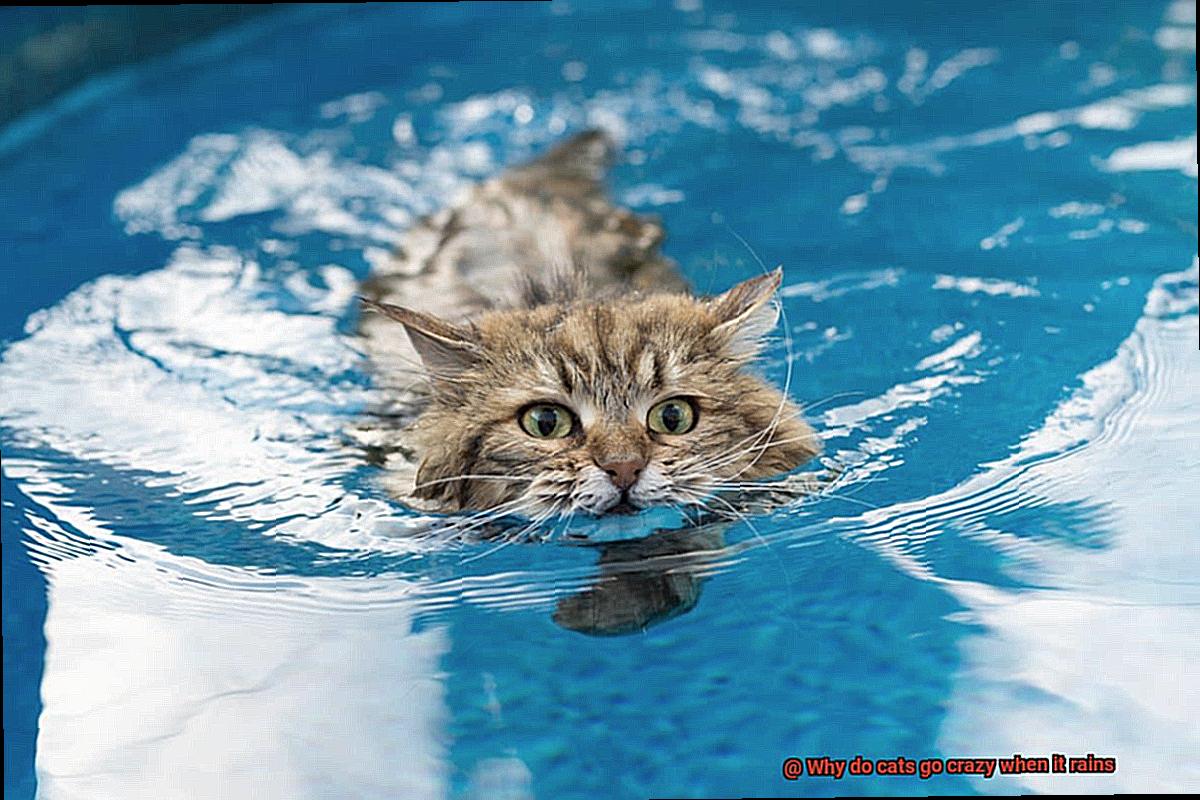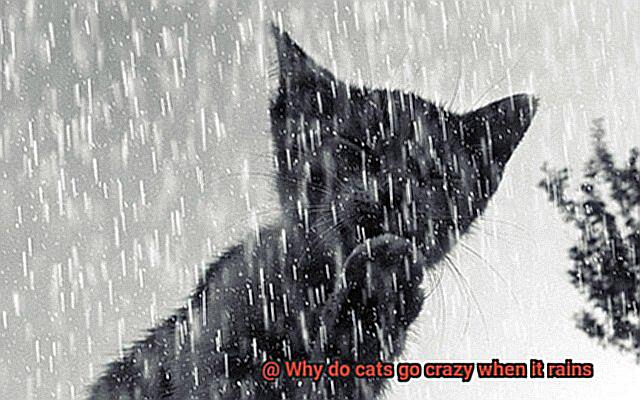Cats are mysterious creatures that have a knack for surprising us with their strange and quirky behaviors. One such behavior is their reaction to rain. As soon as the first drop hits the windowpane, our feline friends go into overdrive, dashing around the house, meowing loudly, or hiding under the bed.
But why does rain turn our cats into wild beasts? It’s not like water falling from the sky is inherently scary or threatening. Yet, for some reason, cats seem to feel invaded or under attack by it.
Experts have put forth various theories to explain this phenomenon. Some suggest that it’s the sound of raindrops hitting the roof or ground that startles cats and makes them feel uneasy. Others believe that cats may be responding to changes in atmospheric pressure associated with a rainstorm. As sensitive creatures, they can pick up on these subtle changes and react accordingly.
Regardless of the reason behind this behavior, one thing is clear: cats have a unique relationship with rain. In this blog post, we’ll dive deeper into this fascinating topic and explore different theories about why cats go crazy when it rains. So sit back, relax (or grab some catnip), and let’s get started.
Predatory Instincts Theory
If you’ve ever noticed your cat acting oddly during rainy weather, you’re not alone. Many cat owners have seen their furry friends become more active, agitated, or even aggressive. One possible explanation for this behavior is the predatory instincts theory.
This theory suggests that the sound of rain hitting surfaces can mimic the sound of small prey animals scurrying around. For cats, this can trigger their natural hunting instincts and draw out potential targets. Cats have highly attuned senses for detecting movement and sounds associated with prey, so rainy weather can make it easier for them to detect prey and become more active.
However, the predatory instincts theory doesn’t tell the whole story. Cats that spend most of their time indoors may become restless and bored without enough stimulation. This boredom can lead them to become more active during rainy weather as a way to alleviate their restlessness.
You can help your pet during rainy days by providing plenty of toys and activities that simulate hunting and chasing. Scratching posts and interactive playtime with their owners are also great options to help alleviate boredom.
It’s essential to remember that there’s no one definitive answer as to why cats go crazy when it rains. It’s likely a combination of factors, including instinctual behavior, boredom, and physical discomfort.
Boredom Theory
Well, according to the Boredom Theory, your feline friend may be bored out of their mind. When it’s raining outside, cats can’t play or hunt for prey like they usually do. This lack of stimulation can cause boredom and restlessness, leading some cats to run around the house, knock things over, or meow excessively.

So, what can you do to keep your kitty entertained and mentally stimulated during rainy days? One solution is to provide them with interactive toys and puzzles that simulate hunting and play. These toys will give your cat the mental stimulation they need to stay engaged and happy. You can also join in on the fun by tossing balls or playing with feather wands with your feline friend.
It’s important to remember that not all cats will experience boredom during rainy weather. Some cats may enjoy watching the rain from a cozy spot indoors, while others may feel anxious or scared during thunderstorms. As a responsible pet owner, it’s crucial to pay attention to your cat’s behavior and provide them with the care they need during rainy days.
To sum it up, boredom can cause cats to act out during rainy weather, but there are ways to prevent it.
Atmospheric Pressure Theory
Many cat owners have observed their cats behaving erratically when there’s a downpour. But why do cats go crazy when it rains? There are several theories, and one of them is the atmospheric pressure theory.
According to this theory, cats may be sensitive to changes in barometric pressure that happen during rainy weather. As the atmospheric pressure drops, it could cause discomfort to the cat’s inner ear, which is responsible for maintaining balance and coordination. This discomfort could lead to a feeling of disorientation and unease, causing the cat to exhibit strange behavior.
But atmospheric pressure isn’t the only factor that may contribute to your kitty’s rainy day antics. Cats have highly attuned senses, and they can detect changes in air pressure that humans cannot. When a storm brews, there are often changes in the static electricity in the air that cats pick up on. This may cause them to become anxious or agitated, leading to erratic behavior.
Of course, boredom may also play a role in your cat’s behavior during rainy weather. Just like humans, cats can become restless and antsy when cooped up inside for too long. They may have excess energy and need an outlet for their pent-up energy. Playing with toys or engaging in interactive play with their owners can help alleviate boredom and provide much-needed stimulation.
So what can you do to help your furry companion during rainy days? Providing plenty of mental and physical stimulation is key. Interactive toys and puzzles that simulate hunting and play can keep your kitty entertained for hours, and even joining in on the fun yourself can make for a great bonding experience.
Other Potential Causes of Rain-Induced Crazy Behaviors in Cats

Rain-induced crazy behaviors in cats are a common occurrence, and there are several potential causes that could be at play.
One possible explanation is that the sound of rain tapping against windows or roofs can make some cats feel anxious or stressed. This is especially true for cats who are sensitive to loud noises or have had traumatic experiences during storms.
So, if your cat starts acting out during rainy weather, it’s worth considering whether they might be feeling overwhelmed by the noise and commotion.
Another factor to consider is changes in barometric pressure, which can affect a cat’s balance and make them feel disoriented or unbalanced. This can lead to wild behavior such as running around, meowing loudly, or hiding in unusual places. If you notice your cat behaving unusually during rainy weather, this could be a sign that they’re struggling to adjust to the change in atmospheric pressure.
Furthermore, rainy days can disrupt a cat’s normal routine, leaving them feeling bored and restless.
For indoor cats especially, spending time cooped up inside with limited opportunities for exercise or playtime can result in pent-up energy and frustration, which may manifest as hyperactivity or destructive behavior.
To help your cat cope with rainy weather, it’s important to provide plenty of stimulation and opportunities for play. Interactive toys and puzzles can help keep your cat entertained while also strengthening your bond.
And if you’re concerned about your cat’s behavior during rainy weather, don’t hesitate to consult with a veterinarian to rule out any underlying medical issues or anxiety disorders.
How to Keep Your Cat Calm During a Rainstorm
You may have observed your feline friend’s peculiar behavior during rainstorms. Whether it’s the sound of pattering rain or changes in atmospheric pressure, many cats become restless, anxious, and even aggressive when the weather turns gloomy. If you wonder how to keep your cat calm during a rainstorm, here are five tips to help alleviate their anxiety and keep them happy and relaxed:
Create a Safe and Comfortable Space
First, make sure your cat has a cozy bed, favorite hiding spot, or even a special room in your home where they feel secure. This will give them a sense of comfort and safety during the storm. Put some soft blankets, pillows, or toys to make this space more inviting.
Provide Distractions
Engage your cat in playtime with their favorite toys or offer them some tasty treats to keep their mind off the storm outside. You could also try playing some calming music or white noise in the background to help drown out the sound of the rain. Interactive toys such as puzzle feeders can also help keep your cat occupied and engaged.
Use Pheromones
Consider investing in pheromone diffusers or sprays that release calming scents that mimic the natural pheromones of cats. These products can help reduce stress and anxiety by creating a more relaxing environment for your cat.
Avoid Reinforcing Anxious Behaviors
Try to remain calm and reassuring around your cat during a rainstorm. Avoid giving them too much attention or coddling them when they’re acting fearful or anxious as this can reinforce their anxious behavior. Instead, provide positive reinforcement when they remain calm and relaxed.
Stay Calm and Reassuring: Cats are incredibly perceptive animals and will pick up on any anxiety or stress you may be feeling. By remaining calm and confident, you can help reassure your cat that everything is okay and that they are safe and protected. You could talk to them in a soothing voice, stroke them gently, or give them some light massage to help them relax.
Overall, keeping your cat calm during a rainstorm is all about creating a safe and comfortable environment, providing distractions and positive reinforcement, using pheromones, and remaining calm and reassuring. With these tips in mind, you can help your furry friend weather any storm with ease.
MrrzlLCT86s” >
Conclusion
To sum up, cats are endlessly fascinating creatures that never fail to surprise us with their quirky behaviors. One such behavior is their seemingly inexplicable reaction to rain, which can transform them into frenzied beasts. While experts have put forth several theories to explain this phenomenon, including the predatory instincts theory, boredom theory, and atmospheric pressure theory, it’s likely that a combination of factors contributes to cats’ wild behavior during rainy weather.
As responsible pet owners, we can do our part to help our feline friends cope with rainy days by providing them with plenty of mental and physical stimulation through interactive toys and puzzles. Additionally, creating a safe and comfortable space for them to retreat to during storms and using pheromone diffusers or sprays can also help reduce stress and anxiety.
It’s crucial to pay close attention to our cat’s behavior during rainy weather as it could be an indication of underlying medical issues or anxiety disorders. By remaining calm and reassuring around our cats during storms, we can help alleviate their anxiety and keep them happy and relaxed.







